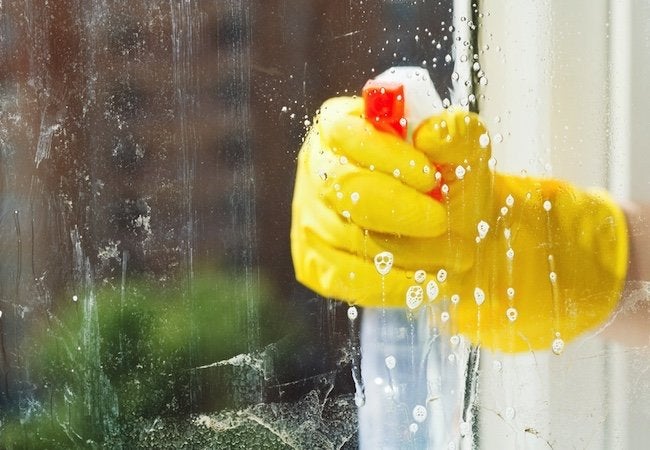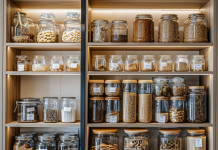Achieving streak-free windows is easier and less expensive than you think. Mix three common ingredients in a spray bottle and start cleaning Click here for the recipe.
Dirty windows and streak-free glass doors are easy to see and easy to clean. But cleaning windows and doors is something we always put off, even though it requires minimal effort. No more excuses! Here’s a recipe for a DIY glass cleaner that doesn’t require fancy cleaners or tools and can be made for free with things you have at home.
Save money by making your own DIY glass cleaner. This homemade window cleaner is a solution of vinegar, water, and other ingredients you can actually pronounce, and you can quickly stir it up and store it under the sink, ready to use the next time you need it.

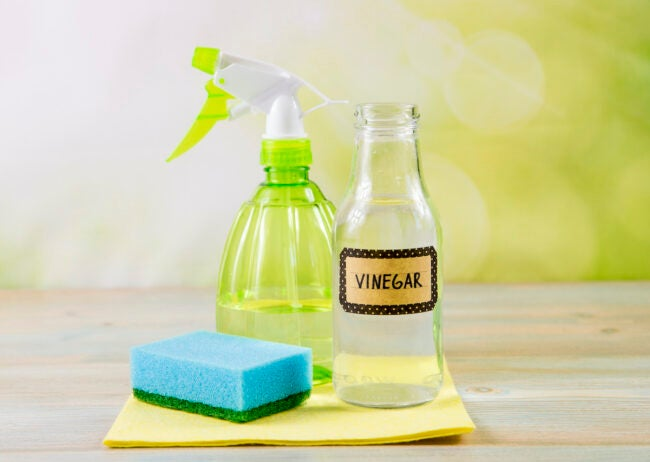
Step 1: Gather your ingredients.
Before learning how to clean windows with vinegar, you first need to gather the ingredients for this DIY glass cleaner. All you need is white vinegar (or lemon juice) and dish detergent. You can add fragrant essential oils, but it is not necessary.
In this recipe, as in many other non-toxic homemade cleaners, white vinegar plays an important role. Its acid properties allow it to cut through dirt and grease and remove stuck-on debris and streaks.
After years of cleaning windows with commercial cleaners such as 409 or Windex, a subtle waxy film may be left on the glass. This residue can be easily washed away with regular detergent, which is part of what makes homemade window cleaners so effective.
Step 2: Mix the homemade window cleaner ingredients and dilute with warm water.
In a spray bottle, combine 1/4 cup white vinegar and 1/2 teaspoon liquid dish detergent. Dilute with 2 cups of water and shake the bottle vigorously to mix the ingredients. If white vinegar is not on hand, lemon juice can be substituted. Lemon juice, like distilled white vinegar, has a mild acidity that will cut grease stains brilliantly.
Step 3: Add oil to give the cleaner a nice aroma (optional).
Cleaning with vinegar is very attractive, but some people don’t like the strong aroma. Fortunately, you can mask the smell of homemade glass cleaner by adding essential oils to the spray bottle mixture. Choose your favorite essential oil and add 10-15 drops.
Now that you have homemade glass cleaner, spray it on the window glass and, using a lint-free cloth, wipe the entire surface you want to clean with the cleaner. Be careful not to use a cloth or sponge as it will leave streaks. A microfiber cloth or chamois leather will work best. The cleaner dries quickly and leaves a streak-free shine.
How the Ingredients Work
Vinegar.
Distilled white vinegar is suitable for cleaning glass because it contains mainly acetic acid. This colorless organic compound gives white vinegar its pungent taste and aroma and kills some bacteria. Washing windows with vinegar not only breaks down and removes dirt, grease, and minerals, but also kills bacteria on hard surfaces in the house.
It is important to note, however, that vinegar-based cleaning solutions do not replace true disinfectants that eliminate 99.9% of disease-causing bacteria and viruses, which is the EPA’s standard for products labeled as disinfectants.
Lemon Juice
The acid in lemon juice, like white vinegar, is effective in breaking down stains on glass surfaces such as windows. Technically, the citric acid in lemon juice is slightly stronger than the acetic acid in vinegar, but both are equally effective for cleaning.
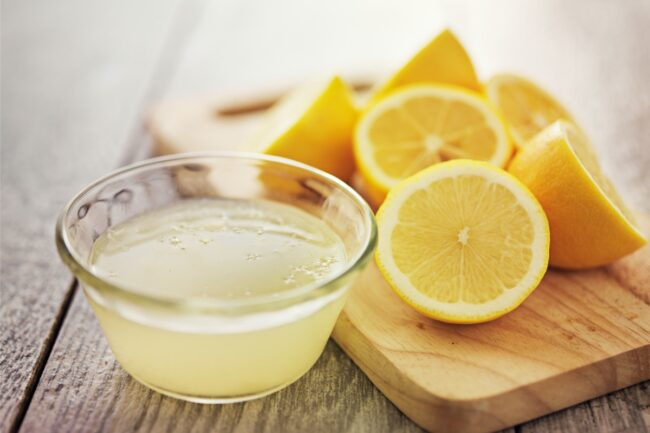
Detergents
Commercial dishwashing detergents contain several ingredients, notably sodium lauryl sulfate, which gives dishwashing detergents excellent grease removal properties. This ingredient binds to oily particles and lifts them off the surface, where they are easily removed when used with water.
Essential oils.
Homemade window cleaners leave an attractive scent. Many essential oils contain natural chemicals that provide both cleaning power and a pleasant scent. For example, tea tree essential oil not only has a fragrance, but also has antibacterial, antiseptic and antifungal properties. When mixed with homemade window cleaners, it can also help prevent the formation of mold and mildew.
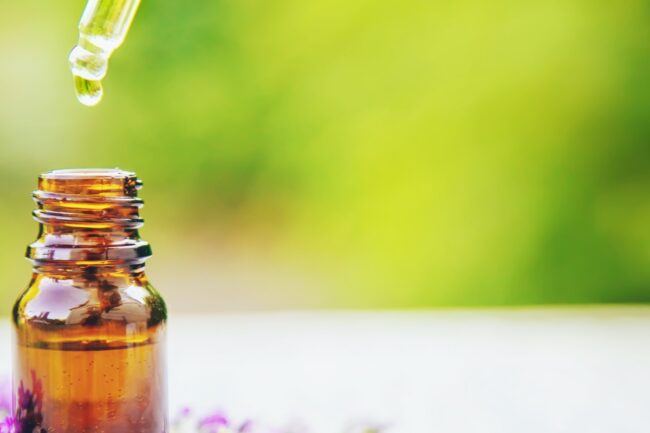
Slightly warm water
As with cleaning the rest of your home, there is a difference in the temperature of the water. Hot water has more kinetic energy than cold water, which makes it easier to stir and lift dirt from surfaces. Hot water is not necessary for cleaning windows, although it is useful to some extent for washing dishes and clothes. Cold or lukewarm water is sufficient.
Window Cleaning Tips
Cleaning windows should be high on your list of seasonal cleaning tasks. The warm weather of early spring is the perfect time to tackle window cleaning, both inside and outside the house. Before spraying the glass, the following window cleaning tips should help
- Remove dust. If your windows are dusty but not streaky, you can clean them without using a cleaning solution (homemade or otherwise). Simply use a lint-free cloth to absorb and remove the dust. Then use another clean cloth to wipe the glass so there are no streaks and you are done.
- Wait for good weather conditions If possible, clean the windows on a cloudy day. If the sun shines directly on the windows, the cleaning solution will dry quickly and may leave streaks or water marks.
- Start with the bars and frames Window bars and frames may be dirtier than the glass. Cleaning these areas before cleaning the window glass will prevent dust from sticking to the glass during the cleaning process.
- Clean the inside and outside of windows twice a year. Getting into the habit of cleaning the inside and outside of each window twice a year will help prevent the accumulation of dust, dirt and mineral deposits.
The best way to wipe up window stains
While paper towels can be used, a soft microfiber cloth is best for removing dirt and debris from windows first. Then, using another clean microfiber cloth, mix a homemade window cleaner onto the glass surface to remove stubborn dirt and residue. Coffee filters and squeegees are also suitable for window cleaning. The latter is especially useful for deep cleaning the outside of windows and can be a DIY solution rather than hiring a professional window cleaner.
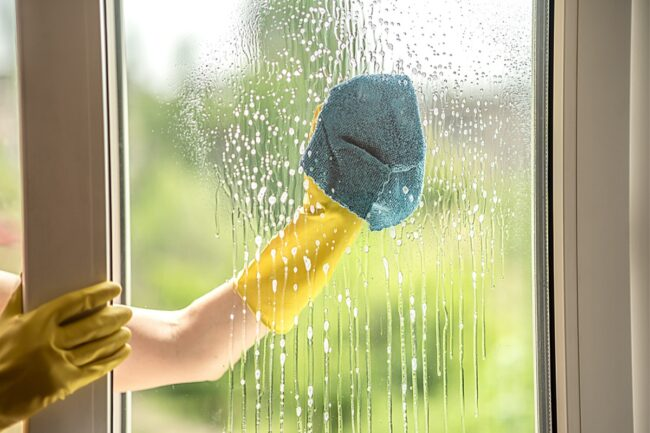
Safety precautions when mixing homemade glass cleaners
While using natural ingredients is more environmentally friendly and safer for your skin and lungs than the chemicals found in commercial cleaners, there are a few things to keep in mind when making your own window cleaners. Natural ingredients such as white vinegar, lemon juice and essential oils are effective homemade window cleaners, but they are not a substitute for real disinfectants, which are proven to kill 99.9% of disease-causing pathogens.
The most important thing to remember when making window cleaners (or any other homemade cleaning solution) is to never mix vinegar with chlorine bleach. When sodium hypochlorite (the basic compound in bleach) is mixed with the acetic acid in vinegar, toxic chlorine gas is produced. Chlorine gas can cause skin burns and shortness of breath, and long-term exposure can lead to death.
Glass cleaners and window cleaners
Many commercial glass cleaners are formulated with ammonia and may leave streaks or fogging on certain types of glass. For example, automotive windows should not be cleaned with window cleaners that contain ammonia. This is because these residues have the potential to obstruct the driver’s vision. Natural ammonia-free glass cleaners, such as the homemade cleaner recipe above, can be wiped with a clean microfiber cloth without leaving any residue or streaks.
Finally.
The best window cleaners are safe, natural and effective. The natural window cleaners in this recipe will help you achieve all of these goals and leave your windows clear, clean and spotless. Mixing a few drops of essential oils can add a pleasant scent to a vinegar-based cleaner.
Cleaning the windows in your home doesn’t have to be a daunting task. Consider focusing on one floor or room at a time and keep the amount of work manageable. Remember to clean outside windows and screens a few times a year as well.
Frequently asked questions about DIY window cleaners
Do you have additional questions about cleaning windows with homemade window cleaners? Please refer to the Frequently Asked Questions below for more information.
Q: Can I use alcohol instead of vinegar to clean my windows?
Yes, if you don’t have vinegar on hand, you can use alcohol to clean your windows. To make the best window cleaning solution with alcohol, add 1½ cups of water, 1½ cups of alcohol and 2 tablespoons of white vinegar (if available) to a spray bottle. Close the bottle and shake to mix the ingredients, then use it to clean windows and other glass surfaces in your home.
Q: Why do my windows have streaks when I clean them?
If there is any residual ammonia-based commercial window cleaner on the glass, the windows may streak. To clean your windows, try making a natural homemade window cleaner using distilled vinegar, water, lemon juice, essential oils and dish detergent.
Q: How do I deep clean my windows?
First, clean the window frames and windows with a solution of distilled vinegar and water. Next, mix distilled vinegar, lemon juice, water, essential oils and dish detergent and use that solution to clean the glass.

